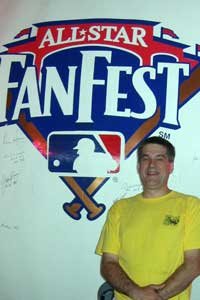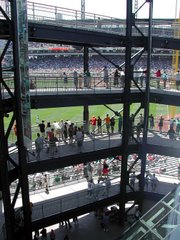We're familiar with the fixtures of the All-Star Game, players like Stan Musial, Hank Aaron and Willie Mays, each of whom participated in 24 of the contests. Or Babe Ruth, who was getting up there in years (and pounds) when the game came into being, but still managed to belt the first All-Star home run.
But what about the players who aren't quite as well-known but managed to make All-Star squads?
I started jotting down names and came across many that were surprising, some I didn't recognize, and others who have interesting stories to be told. Here's a sampling:
• Eddie Brinkman, Tigers SS, 1973. Brinkman stuck in the majors for a long time as a slick fielder when shortstops weren't necessarily expected to hit a ton. (Think Mark Belanger.) But Brinkman took that kind of to something an extreme, posting three sub-.190 seasons out of four in the '60s on his way to a .224 lifetime average. In his 13th season, he managed to make the All-Star team when he managed to keep his average above .250 at the break. He finished the season at .237, but did play in all 162 of Detroit's games.
• Dick Dietz, Giants C, 1970. Power-hitting always have been a highly sought commodity, and San Francisco came up with one in the late '60s. Dietz certainly deserved his All-Star accolades in '70, not quite posting the numbers of fellow catcher Johnny Bench, but finishing the season at .300 with 22 home runs, 107 RBI and 109 walks. Dietz put up respectable numbers (.252-19-72) as his team won the NL West. But he also served as the Giants' player representative during the strike that delayed the start of the '72 season, and San Francisco management decided to cut him loose. The Dodgers claimed him off waivers, but he played sparingly and was gone from the majors after '73.
• Bert Haas, Reds OF-1B, 1947. Haas apparently opened some eyes when he returned from World War II to steal 22 bases, a relatively high total for the time, in 1946. Perhaps that stuck in Cardinal manager Eddie Dyer's mind when he selected the '47 All-Star team; otherwise, Haas' totals for that season look rather pedestrian at .286-3-67 and just nine steals. Haas was 33 when he played in his only All-Star game and hung on just three more years as a part-timer.
• Ray Lamanno, Reds C, 1946. The National League squad set a record in the '46 game by losing 12-0, and having players like Lamanno on the team didn't help. The returning war veteran had posted a decent season in 1942, but in '46 was platooning at catcher with Ray Mueller. Nevertheless, he made the trip to Fenway Park for the Midsummer Classic and grounded out as a pinch-hitter in the eighth; in the bottom of the inning, he got to watch Ted Williams belt Rip Sewell's eephus pitch into the stratosphere. For his career of four full seasons, Lamanno had a total of 355 hits, which just might be an all-time low for an All-Star.
• Felix Mantilla, Red Sox 2B, 1965. Mantilla is best known as the starting third baseman for the historically inept '62 Mets, and the Big Apple baseball writers loved to write about the team's foibles, including Mantilla's often-adventurous attempts at fielding. Thus ridiculed by undeterred, Mantilla escaped from New York and went on top post good numbers in Boston, including a 30-homer season in 1964. The following year, his fellow players voted him into the All-Star game as a starter when he went int the break hitting .316. The Sox, though, traded him to Houston just before the start of the '66 season, and he couldn't hit in the Astrodome, ending his major-league career at the end of the year.
• Richie Scheinblum, Royals OF, 1972. Scheinblum was one of those players who hit very well in the minors but couldn't find his stroke in The Show. He began in the Cleveland organization, but the Indians gave up on him after they tried to make him a starter in '69 and he responded by hitting .186. He spent a lackluster year in the Washington Senators' system before Kansas City purchased his contract. The Royals might have questioned their wisdom when Scheinblum's average dropped to .214 following two consecutive 0-for-5 games against Oakland in late May. Richie then started an 11-game hitting streak to bump up his average a full 100 points, and he kept up the pace into July, his .324 average leading the AL at the break. He finished the season at .300, one of only five regulars to hit that mark in the American League's final pre-DH season. Nevertheless, the Royals decided to trade him to the Reds in a swap that involved future Kansas City star and manager Hal McRae. Scheinblum stiffed in Cincinnati and bounced around to four more teams before his major-league swan song in '74.
• Don Wert, Tigers 3B, 1968. In the Year of the Pitcher, a player who finished the season at .200 participated in the All-Star Game (which, incidentally, the National League won 1-0). Wert was hitting only .220 at the break, but Detroit was well on its way to winning the AL pennant, so his fellow players must have figured he had something going for him. A look around the league that year doesn't show a whole lot of viable alternatives at the hot corner; besides Brooks Robinson, the All-Star starter, and Sal Bando, in his first full year with the A's, the field included such luminaries as Max Alvis, Joe Foy, Bobby Cox, Aurelio Rodriguez and Pete Ward, all of whom were struggling mightily. As for Wert, he lasted two more years (.225 and .218) as a Tiger starter after his All-Star appearance, before finishing his career on a 2-for-40 skid for the '71 Senators.
I'll focus the attention on All-Star pitchers in the next installment.
Trivia question 48: A pitcher was credited with the victory in an All-Star Game without actually throwing a pitch. Who was he?
Friday, July 6, 2007
Subscribe to:
Post Comments (Atom)









No comments:
Post a Comment